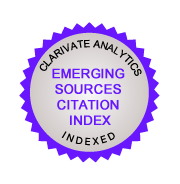Mass Theater in Post-Revolutionary Russia: The Use of Proto-Performance in Urban Contexts as a Formula for Shaping Collective Identity
DOI:
https://doi.org/10.5944/etfvii.9.2021.30491Keywords:
Mass theatre; post-revolutionary Russia; proto-performance; collective identitAbstract
After the October Revolution, Russian society faced the enormous challenge of building a socialist culture in a country with deep-rooted religious and monarchical traditions and a devastated economy. To reach this new cultural horizon and thus cement the political transformations, it was necessary to influence the construction of collective identities - bearers of renewed citizen awareness. In this article we will delve into the way in which mass theatre contributed to achieving this objective not only due to its nature as a rite linked to the heritage of the Orthodox Church, but also through new formulas of inhabiting and interacting with space public. Both the transformation of the meaning conferred on the place and the establishment of a renewed bond between the public and the space was emphasized through symbolic identification and collective action-transformation.
Downloads
References
Alcázar, Josefina: Performance: un arte del yo: autobiografía, cuerpo e identidad. México, Siglo XXI, 2014.
Anikonova, Tatiana: «Театрализированное представление как зрелищная составляющая праздника», Наука. Искусство. Культура, vol. 4, num. 8 (2015).
Anikonova, Tatiana: «Театрализированное представление в контексте культуры», Наука. Искусство. Культура, vol. 2, num. 14 (2017).
https://cyberleninka.ru/article/n/teatralizovannoe-predstavlenie-v-kontekste-kultury
Buck-Morss, Susan: Mundo soñado y catástrofe. La desaparición de la utopía de masas en el Este y el Oeste. Madrid, La balsa de la Medusa, 2004.
Cáceres Delgadillo, Carolina: «Lo ritual y lo sagrado en el teatro», Plurentes. Artes y Letras, num. 10 (2019).
https://revistas.unlp.edu.ar/PLR/article/download/8884/7769?inline=1
Capasso, Verónica: «Producir la y en la ciudad. Espacio urbano, politicidad y prácticas artísticas», Letra. Imagen. Sonido L.I.S. Ciudad mediatizada, vol. 4, num. 10 (2013), pp. 45-54.
Engels, Friedrich: La situación de la clase obrera en Inglaterra. Madrid, Akal, 1976.
Gómez García, Pedro: «El ritual como forma de adoctrinamiento», Gaceta de Antropología - Revista de Antropología Cultural, vol. 18 (2002), pp. 1-13.
Кonovich, Аskold Аrkadievich: Театрализованные праздники и обряды в CCCP. Moscú: Высшая школа, 1990.
Mansur Garda, Juan Carlos: «Habitar la ciudad», Trans-Pasando Fronteras, num. 15 (2020), pp. 173-191.
https://doi.org/10.18046/retf.i15.3999
Marx, Carl; Engels, Friendrich: El manifiesto comunista (1.a ed., 5.a reimp.). Madrid, Akal, 2010.
McNamara, Brooks; Ashley, Jessie; Boyd, F. Sumner; Dodge, Mabel; Haywood, William D.; Reed, John; Sanger, Margaret H.: «Paterson Strike Pageant», The Drama Review: TDR, vol. 15, num. 3 (1971), pp. 61-71.
https://doi.org/10.2307/1144681
Mosienko, Sergei Vladimirovich: «Понятие «театр масс» (к вопросу терминологии и типологии)», Вестник Кемеровского Государственного Университета Культуры и Искусств, vol. 48 (2019), pp. 172-177.
https://cyberleninka.ru/article/n/ponyatie-teatr-mass-k-voprosu-terminologii-i-tipologii
Murray, Natalia: «Street theatre as propaganda: Mass performances and spectacles in Petrograd in 1920», Studies in Theatre and Performance, vol. 36, num. 3 (2016), pp. 230-241.
https://doi.org/10.1080/14682761.2016.1188262
Rolf, Malte: Soviet Mass Festivals, 1917-1991. Pittsburgh, University of Pittsburgh Press, 2013.
Sarriugarte Gómez, Iñigo: «Reflexiones en torno a los procesos actuales del happening, performance, teatro y la danza contemporánea», Bidebarrieta: Revista de humanidades y ciencias sociales de Bilbao, num. 2 (1997) (Ejemplar dedicado a: Hiria, artea eta ondarea. Arte, patrimonio monumental y Ciudad), pp. 179-186.
Sennett, Richard: Carne y piedra: el cuerpo y la ciudad en la civilización occidental. Madrid, Alianza, 2002.
Toriz Proenza, Martha Julia: «Discursos del arte: el teatro y el performance», en Elguea Véjar, Silvia (Coord.): La Otredad. Los discursos de la cultura hoy: 1995. México, 1997, pp. 153-162.
Tupitsyn, Victor; Burenina-Petrova, Olga; Kurchanova, Natasha; Tupitsyn, Margarita: Dadá ruso 1914-1924 (Margarita Tupitsyn, Ed.), Madrid, Museo Nacional Centro de Arte Reina Sofía, 2018.
Valera, Sergi; Pol, Enric: «El concepto de identidad social urbana: Una aproximación entre la psicología social y la psicología ambiental», Anuario de Psicología, vol. 62, num. 3 (1994), pp. 5-24.
Vidal Moranta, Tomeu; Pol Urrútia, Enric: «La apropiación del espacio: Una propuesta teórica para comprender la vinculación entre las personas y los lugares». Anuario de Psicología/The UB Journal of psychology, vol. 36, num. 3 (2005), pp. 281-298.
von Geldern, James: Bolshevik Festivals, 1917–1920. Berkley, University of California Press, 1993.
Ziegler Delgado, María Magdalena: «La revolución artística en Rusia ante la revolución soviética», Revista de Comunicación de la SEECI, vol. 42 (2017), pp. 26-44.
Downloads
Published
How to Cite
Issue
Section
License
Copyright (c) 2021 Anna Borisova Fedotova, Isabel Tejeda Martín

This work is licensed under a Creative Commons Attribution-NonCommercial 4.0 International License.
Authors who publish in this journal agree to the following terms:
- Authors retain copyright and grant the journal right of the first publication with the work simultaneously licensed under a license Creative Commons Reconocimiento-NoComercial 4.0 Internacional that allows others to share the work with an acknowledgement of the work's authorship and initial publication in this journal.

- Authors are able to enter into separate, additional contractual arrangements for the non-exclusive distribution of the journal's published version of the work (e.g., post it to an institutional repository or publish it in a book), with an acknowledgement of its initial publication in this journal.
- Authors are permitted and encouraged to post their work online (e.g., in institutional repositories or on their website) prior to and during the submission process, as it can lead to productive exchanges, as well as to earlier and greater citation of the published work (See The Effect of Open Access).










